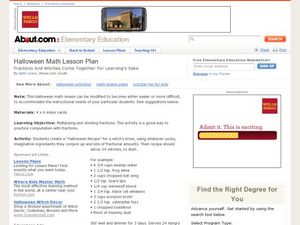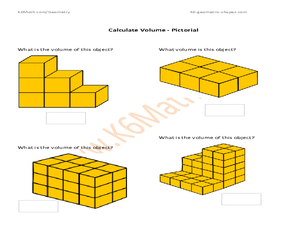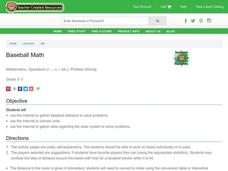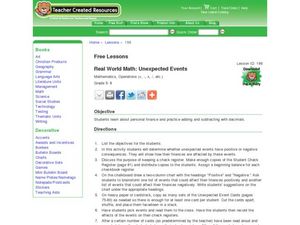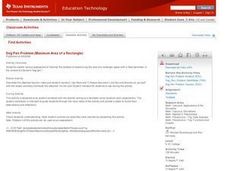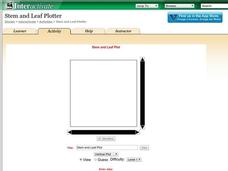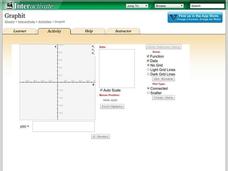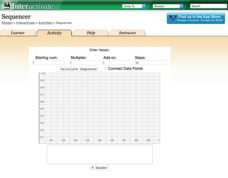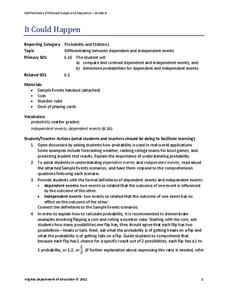Curated OER
Fun with Math using Magnetic Force
Sixth graders explore and discuss the effectiveness of magnets in different situations. In this math lesson, 6th graders discuss rate and graphs after exploring with magnets using different restrictions on the magnets. They analyze their...
Curated OER
Halloween Math Lesson Plan
Students practice their multiplication and division by creating a Witches Brew. For this holiday math lesson, students utilize Halloween style ingredients to create a fun edible treat for themselves. Students practice their measuring...
Curated OER
Calculate Volume: Pictorial
Learners find the volume of four figures drawn in shaded cube form. A reference web site is given for additional activities.
Curated OER
Baseball Math
Fifth graders complete activity pages. In this operations and problem solving lesson, 5th graders use the Internet to gather baseball statistics, solve problems and convert units.
Curated OER
Real World Math: Unexpected Events
Ready to delve into personal finance? Learners discover how to organize a check book register. They practice debits and credits in a math game involving the register they set up. While they gain valuable practical knowledge, they also...
Curated OER
Number Line: Negative Numbers
In this graphing calculator learning exercise for the TI-83 calculator, students first observe a demonstration for calculating negative numbers. Next, students use their graphing calculator to answer 6 thoughtful T/F and short answer...
Curated OER
Grocery Store Math- Home/School Activity
In this home/school consumer math activity, learners examine ways to save money at the grocery store. They work with a family partner to write a menu and write a shopping list. They shop for the items noting the prices and using a...
Math Mammoth
Mental Math
In this math activity, 6th graders solve the problems that ask them to use the correct order to calculate the solutions to the six sets.
Curated OER
Dog Pen Problem
Teach your class about various approaches to solving the problem of maximizing the area of a rectangle space with a fixed perimeter in the context of a farmer's dog pen. Then, they complete a worksheet independently to summarize the...
Virginia Department of Education
Analyzing and Interpreting Statistics
Use measures of variance to compare and analyze data sets. Pupils match histograms of data sets to their respective statistical measures. They then use calculated statistics to further analyze groups of data and use the results to make...
Virginia Department of Education
z-Scores
Just how far away from the mean is the data point? Pupils calculate the standard deviation for a set of data and find out how many standard deviations a point is away from the mean. The teacher leads a discussion on how to calculate...
University of Colorado
Modeling Sizes of Planets
The density of the huge planet of Saturn is 0.7 g/cm3, which means it could float in water! In the second part of 22, science pupils explore the size and order of the planets. They then calculate weight and/or gravity and density of...
Shodor Education Foundation
Stem and Leaf Plotter
The key is in the leaves. Pupils enter data to create a stem-and-leaf plot. The resource then displays the plot and calculates the mean, median, and mode of the data. Using the plot and the calculated measures of spread, learners analyze...
Partnership for Educating Colorado Students
Mayan Mathematics and Architecture
Take young scholars on a trip through history with this unit on the mathematics and architecture of the Mayan civilization. Starting with a introduction to their base twenty number system and the symbols they used, this eight-lesson unit...
Virginia Department of Education
Box-and-Whisker Plots
The teacher demonstrates how to use a graphing calculator to create box-and-whisker plots and identify critical points. Small groups then create their own plots and analyze them and finish by comparing different sets of data using box...
Shodor Education Foundation
Graphit
No graphing calculator? No worries, there's an app for that! Young mathematicians use an app to graph functions. In addition, they can also plot data points.
EngageNY
Writing and Evaluating Expressions—Exponents
Bring your young mathematicians into the fold. Scholars conduct an activity folding paper to see the relationship between the number of folds and the number of resulting layers in the 23rd installment of a 36-part module. The results of...
Shodor Education Foundation
Sequencer
Take the first step into graphing sequences. Learners set the starting number, multiplier, add-on, and the number of steps for a sequence. Using the inputs, the interactive calculates and plots the sequence on the coordinate plane. Users...
Curated OER
Candy Machine
Using the concept of a candy vending machine, young mathematicians explore the sugar ratios found in different types of candy. Using the provided information, class members calculate and compare different ratios in order to find the...
Virginia Department of Education
It Could Happen
Understanding of probability will probably increase with the use of a refined resource. Pupils learn to distinguish between dependent and independent events as they calculate the probabilities of these types of events in various situations.
Big Kid Science
Measuring Shadows Using an Ancient Method
How did ancient peoples determine the height of really tall objects? Young scientists and mathematicians explore the concept of using shadows to measure height in a hands-on experiment. Paired pupils measure shadows, then calculate the...
Noyce Foundation
Rabbit Costumes
How many rabbit costumes can be made? This is the focus question of an activity that requires scholars to use multiplication and division of fractions to solve a real-world problem. They determine the amount of fabric necessary for eight...
EngageNY
Multiplication of Numbers in Exponential Form
Develop a solid understanding of multiplication and division properties of exponents. Individuals expand exponential terms to discover the patterns and create the properties in the second installment in a series of 15. The activity...
Scholastic
Study Jams! Surface Area
Explore surface area and calculate how much wrapping paper one needs to cover a whole box with this math video. The resource gives a nice visual of surface area and explains the use of a square unit.



